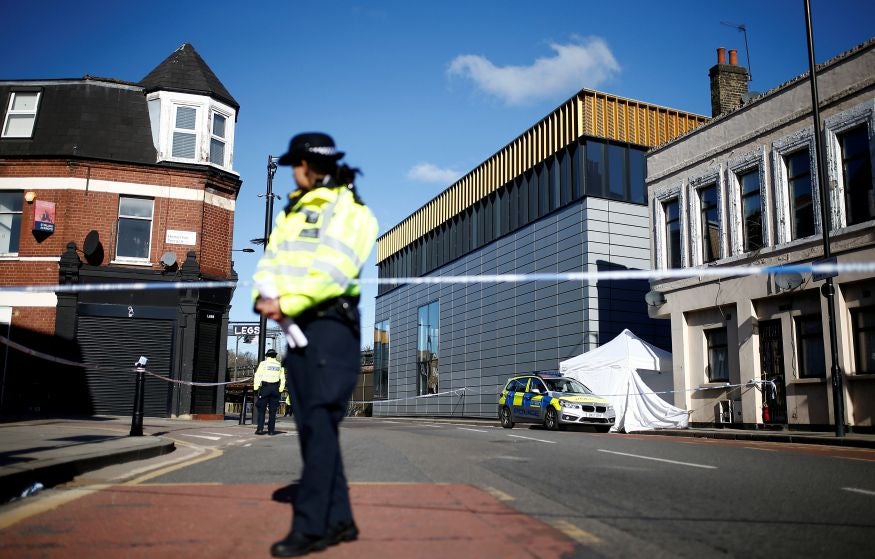Criminologists slam ‘misleading’ Policy Exchange report linking drill music to youth violence
Exclusive: 49 criminology experts sign an open letter condemning landmark report as ‘unreliable and misleading’

Your support helps us to tell the story
From reproductive rights to climate change to Big Tech, The Independent is on the ground when the story is developing. Whether it's investigating the financials of Elon Musk's pro-Trump PAC or producing our latest documentary, 'The A Word', which shines a light on the American women fighting for reproductive rights, we know how important it is to parse out the facts from the messaging.
At such a critical moment in US history, we need reporters on the ground. Your donation allows us to keep sending journalists to speak to both sides of the story.
The Independent is trusted by Americans across the entire political spectrum. And unlike many other quality news outlets, we choose not to lock Americans out of our reporting and analysis with paywalls. We believe quality journalism should be available to everyone, paid for by those who can afford it.
Your support makes all the difference.Criminology experts across the UK have condemned a recent Policy Exchange report linking youth violence in London to drill music.
A total of 49 criminology professors, doctors and educational groups signed the letter seen exclusively by The Independent calling the report “politically dangerous.”
The Policy Exchange report Knife Crime in the Capital stated that more than a third of “gang-related homicides” in 2018 were linked to drill music. The report also criticised brands such as Adidas for making drill more “appealing” by supporting artists involved in knife crime, citing a campaign the sports brand did with rapper Headie One.
Dr Lambros Fatsis, senior lecturer in criminology at the University of Brighton, said the report relied on “shaky evidence, uses contested terminology carelessly and risks wild assumptions that are based on falsehoods and misinterpretations.”
“It goes against everything we know in research of criminology, youth justice, knife crime, policing as well as black culture in rap music in particular,” Dr Fatsis told The Independent. “The combo of all those things make it a piece of writing that is dangerous to public opinion in the sense that it’s deeply flawed and misleading to the public.
“The report only simply states that drill is responsible for violent crime but only cites analysis from Policy Exchange which is never referenced and not discussed how it was conducted so we don’t know if it’s reliable at all.”
Dr Fatsis said evidence for the link between drill music and youth violence is lacking and that attributing the issues of youth violence to specific groups or types of music distracts attention from findings by criminological experts who have researched the root causes of crime.
Want us to report on an issue that matters to you? Contact us by clicking here
“Most criminologists would say poverty and social inequality are always the main drivers behind violence but somehow that doesn’t have the same ring to it [as drill music]. You don’t know who to blame with such a fact,” Dr Fatsis said.
In the report Policy Exchange considered the link between drill music and youth violence as an instance “where either the victim or perpetrator was an aspiring drill rapper, or drill music videos were used as evidence in the trial”. The letter criticised this approach insisting that it doesn’t explore the nuances of the legal process including how the evidence is handled and what guidance is given regarding it.
The report also found that 40 per cent of youth violence homicides were linked to social housing, however this was discussed considerably less than drill music or tactics of the Metropolitan Police.
“If conditions of poverty and social inequality in areas that suffer from state neglect were acknowledged, the entire report would collapse,” Dr Fatsis said. “This is not a report that’s interesting in identifying key drivers of violence but works towards justifying more punitive criminal justice system policy and ideologically motivated analysis that supports overpolicing and punishment for unequal social conditions.”
The report, which is endorsed by broadcaster Trevor Phillips, who is a senior research fellow at Policy Exchange was released in October with the foreword by Mark Rowley, former assistant commissioner of the Metropolitan Police. It criticised the Met for its reliance on “suppressive tactics” such as stop and search, but also called it a “vital tactic that the commissioner was right to increase” calling the disproportionate number of young black men killed, the “real injustice.”
While signatories of the letter agreed with criticisms of the Met, the letter accused the report of “dismissing concerns about the disproportionate use of stop and search on Black Britons”.

“Isn’t both the fact young black men are being disproportionately targeted by stop and search as well as the fact that they are the casualties of violence an injustice? The two things are not mutually exclusive,” Dr Fatsis said.
He called on more attention turned to the impacts of social inequality and poverty on youth violence and how public safety can be developed through investment into healthcare and welfare as opposed to solely punitive measures.
“In the aftermath of the recent wave of #Black Lives Matter protests which attuned many to the realities of police racism and criminal injustice, the publication of such an unreliable report couldn’t be more worrying,” the letter read in closing.
“We therefore write openly to challenge the claims it makes as experts in the very topics that this Policy Exchange report does violence to, honouring our commitment to upholding high standards of evidence and integrity in the production and public dissemination of our work.
A Policy Exchange spokesperson said: “We consider our work on knife crime to be robust and an informative analysis of the available data. As far as we can see there is no material criticism of our work in the open letter.”
Join our commenting forum
Join thought-provoking conversations, follow other Independent readers and see their replies
0Comments